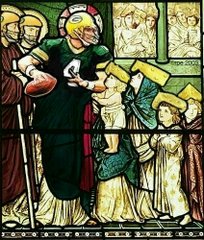 Prayer
Prayer Merciful and everlasting God, You did not spare Your only Son but delivered Him up for us all to bear our sins on the cross. Grant that our hearts may be so fixed with steadfast faith in Him that we fear not the power of sin, death, and the devil; through the same Jesus Christ, our Lord, who lives and reigns with You and the Holy Spirit, one God, now and forever.
Devotional Reading
"'Through [Christ] we have also obtained access by faith into this grace in which we stand, and we rejoice in hope of the glory of God' (Rm 5:2). Christ died for us, reconciled us, brought us to Himself, and gave us unutterable grace...What grace is this? It is being counted worthy of the knowledge of God (2Co 10:5), being forced from error and coming to a knowledge of the truth (1Ti 2:4), and obtaining all the blessings that come through baptism (Tit 3:4-7). He brought us near that we might receive these gifts. For it was not that we might have only remission of sins and be reconciled; but also that we might receive countless blessings beside. Nor did He even stop at these, but promised others, namely, those unutterable blessings that surpass both understanding and language (Phil 4:7). This is why Paul has set them both down also. For by mentioning grace he clearly points at what we have at present received, but by saying, 'And we rejoice in hope of the glory of God,' he unveils the whole of things to come.
"Paul rightly said, 'in which we stand.' For this is the nature of God's grace. It has no end, it knows no bound, but evermore is in advance of greater things, which in human things is not the case. A person who has become a ruler and possesses glory and authority, yet he does not stand in it continuously, but is quickly cast out of it. If another does not take it from him, then death comes and is sure to take it from him. God's gifts are not of this kind. For neither man, nor occasion, nor crisis of affairs, nor even the Devil, nor death can come and cast us out of them. Even when we are dead we then have greater possession of them, and go on enjoying them more and more. So if you feel in doubt about the things to come; believe in them on the basis of those things now present, which you have already received.
"Paul says, 'And we rejoice in hope of the glory of God,' that you may learn what kind of soul the faithful ought to have. It is not only for what have been given, but for what is to be given, that we ought to be confident, as though it were already given. For one 'rejoices' in what is already given. The hope of things to come is even as sure and clear as that which has already been given. In that way also we 'rejoice.'
"For this reason he also called them to 'glory.' For if it contributes to God's glory, come to pass it certainly will, though it does not for our sakes, yet for Him it will. The blessings to come are worthy of being gloried in. Even the evils of this present time are able to brighten our countenances, and make us find in them even our rest."
John Chrysostom, Homilies on Romans
Catechesis
Luther's Large Catechism
V. The Sacrament of the Altar
How can bodily eating and drinking do such great things? / Who receives the pwoer and benefit of this Sacrament?
28 But here our wise spirits twist themselves about with their great art and wisdom. They cry out and bawl, “How can bread and wine forgive sins or strengthen faith?” They hear and know that we do not say this about bread and wine. Because, in itself, bread is bread. But we speak about the bread and wine that is Christ’s body and blood and has the words attached to it. That, we say, is truly the treasure—and nothing else—through which such forgiveness is gained. 29 Now the only way this treasure is passed along and made our very own is in the words “Given … and shed for you.” For in the words you have both truths, that it is Christ’s body and blood, and that it is yours as a treasure and gift. 30 Now Christ’s body can never be an unfruitful, empty thing that does or profits nothing. Yet, no matter how great the treasure is in itself, it must be included in the Word and administered to us. Otherwise we would never be able to know or seek it.
31 Therefore also, it is useless talk when they say that Christ’s body and blood are not given and shed for us in the Lord’s Supper, so we could not have forgiveness of sins in the Sacrament. Although the work is done and the forgiveness of sins is secured by the cross [John 19:30], it cannot come to us in any other way than through the Word. How would we know about it otherwise, that such a thing was accomplished or was to be given to us, unless it were presented by preaching or the oral Word [Romans 10:17; 1 Corinthians 1:21]? How do they know about it? Or how can they receive and make the forgiveness their own, unless they lay hold of and believe the Scriptures and the Gospel? 32 But now the entire Gospel and the article of the Creed—I believe in … the holy Christian Church, … the forgiveness of sins, and so on—are embodied by the Word in this Sacrament and presented to us. Why, then, should we let this treasure be torn from the Sacrament when the fanatics must confess that these are the very words we hear everywhere in the Gospel? They cannot say that these words in the Sacrament are of no use, just as they dare not say that the entire Gospel or God’s Word, apart from the Sacrament, is of no use.
33 So we have covered the entire Sacrament, both what it is in itself and what it brings and profits. Now we must also see who is the person that receives this power and benefit. That is answered briefly, as we said above about Baptism and often elsewhere: Whoever believes the words has what they declare and bring. For they are not spoken or proclaimed to stone and wood, but to those who hear them, to whom He says, “Take, eat,” and so on. 34 Because He offers and promises forgiveness of sin, it cannot be received except by faith. This faith He Himself demands in the Word when He says, “Given … and shed for you,” as if He said, “For this reason I give it, and ask you to eat and drink it, that you may claim it as yours and enjoy it.” 35 Whoever now accepts these words and believes that what they declare is true has forgiveness. But whoever does not believe it has nothing, since he allows it to be offered to him in vain and refuses to enjoy such a saving good. The treasure, indeed, is opened and placed at everyone’s door, yes, upon his table. But it is necessary that you also claim it and confidently view it as the words tell you. 36 This is the entire Christian preparation for receiving this Sacrament worthily.
Concordia : The Lutheran Confessions. Edited by Paul Timothy McCain. St. Louis, MO : Concordia Publishing House, 2005, S. 435






No comments:
Post a Comment